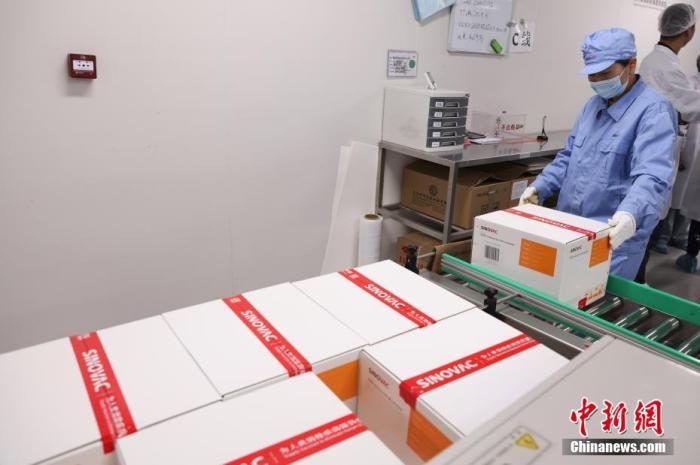China News Service, July 13th, a comprehensive report. The Global Alliance for Vaccines and Immunization (GAVI) announced on the 12th that it has signed a pre-purchase agreement (APA) with Sinopharm and Kexing Biotechnology. Implementation Plan" (COVAX) to provide vaccines.
As the main supporter of the COVAX program, the Global Alliance for Vaccines and Immunization said: “Just as the delta variant virus poses a new threat to the public health system, we have reached the above agreement with two vaccine manufacturers in China, and they will provide the COVAX program. 110 million doses of the new crown vaccine, with the option of increasing supply."
Data map: The new crown vaccine produced by China National Pharmaceutical Group taken by the reporter in Beijing.
Photo by China News Agency reporter Jiang Qiming
According to the agreement, Beijing Biologics, a subsidiary of China National Pharmaceutical Group, will provide 60 million doses of its developed "BBIBP-CorV" vaccine from July to October 2021.
In addition, Gavi can choose to purchase a further 60 million doses of the new crown vaccine in the fourth quarter of 2021 and another 50 million doses in the first half of 2022.
In other words, Sinopharm will provide 170 million doses of vaccine.
Kexing will supply 50 million doses of the inactivated vaccine "CoronaVac" from July to September.
In addition, Gavi can choose to purchase a further 150 million doses of the new crown vaccine in the fourth quarter of 2021 and another 180 million doses in the first half of 2022.
By then, Kexing will provide a total of 380 million doses of vaccine.
Part of these vaccines will be donated to poor countries, and the other part will be sold to participating countries in the COVAX initiative.
Data map: On May 11, Beijing Daxing, in the production workshop of Beijing Kexing Zhongwei Biotechnology Co., Ltd., workers carry packaged vaccines.
Photo by China News Agency reporter Jiang Qiming
Seth Berkeley, CEO of the Global Alliance for Vaccines and Immunization, expressed his appreciation for reaching an agreement with Chinese vaccine manufacturers.
Berkeley said: "Given that the above two Chinese vaccines have been included in the World Health Organization's emergency use list, with the conclusion of the agreement, we can immediately begin to provide these vaccines to relevant countries."
As a result, the types of new crown vaccines applicable to the COVAX plan have increased by two. Up to now, the plan has included 11 vaccines and candidate vaccines, including AstraZeneca, Johnson & Johnson, Pfizer and Modena.
Under the advocacy of the World Health Organization and the non-profit Alliance for Epidemic Prevention and Innovation (CEPI), COVAX launched a plan to promote the rational distribution of new crown vaccines to help poor countries also get enough new crown vaccines.
However, the work of raising donations to purchase vaccines for poor countries is not going well.
As of June 12, COVAX has provided 102 million doses of the new crown vaccine to 135 countries around the world, which is far below the target set at the beginning of the year.
The Director-General of the World Health Organization Tan Desai has previously criticized "vaccine nationalism."
He said that a small number of countries are hoarding large amounts of vaccines, which has led to a "sorrowful unfair situation" in the global vaccine supply.
According to data provided by the United Nations, the universal vaccination rate of the new crown vaccine in some developed countries has reached 70%, while the overall vaccination rate in some low-income countries is less than 1%.

